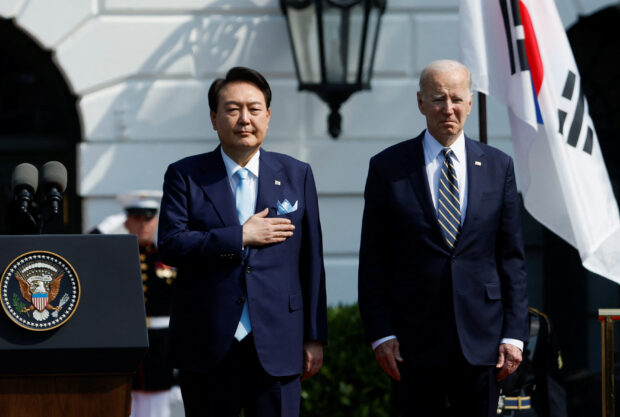South Korea, US to share nuclear planning to deter North Korean threat

U.S. President Joe Biden and South Korea’s President Yoon Suk Yeol stand on stage together during an official White House State Arrival Ceremony on the South Lawn of the White House in Washington, U.S. April 26, 2023. (REUTERS)
WASHINGTON – The U.S. on Wednesday pledged to give South Korea more insight into its nuclear planning over any conflict with North Korea amid anxiety over Pyongyang’s growing arsenal of missiles and bombs.
The announcement, which included a renewed pledge by Seoul not to pursue a nuclear bomb of its own, emerged from White House talks between U.S. President Joe Biden and South Korean leader Yoon Suk Yeol that covered issues including North Korea, semiconductor chips and trade and the Ukraine war.
At a joint news conference, Yoon announced that he and Biden had agreed on steps to strengthen South Korea’s defenses in response to the threat posed by North Korea.
“Our two countries have agreed to immediate bilateral presidential consultations in the event of North Korea’s nuclear attack and promised to respond swiftly, overwhelmingly and decisively using the full force of the alliance, including the United States nuclear weapons,” Yoon said.
Biden again reiterated the U.S. offer to North Korea to hold diplomatic negotiations over its nuclear and missile programs, an offer that has been ignored by North Korean leader Kim Jong Un.
North Korea’s mission to the United Nations did not immediately respond to a request for comment.
DETERRING NORTH KOREA
North Korea’s rapidly advancing weapons programs – including ballistic missiles that can reach U.S. cities – have raised questions about whether the U.S. would really use its nuclear weapons to defend South Korea under what it calls “extended deterrence.”
Opinion polls in South Korea show a majority of the public wants Seoul to acquire its own nuclear bombs, a step Washington opposes.
Under a new “Washington Declaration,” the U.S. will give South Korea detailed insights into, and a voice in, U.S. contingency planning to deter and respond to any nuclear incident in the region through a U.S.-ROK Nuclear Consultative Group, U.S. officials said.
As part of the deal, Washington will deploy a ballistic-missile submarine to South Korea in a show of force. It will be the first such submarine visit since the 1980s, U.S. officials said.
But Biden made clear no U.S. nuclear weapons would be stationed on South Korean territory.
“I have absolute authority as commander in chief and the sole authority to use a nuclear weapon, but … what the declaration means is that we’re going to make every effort to consult with our allies when it’s appropriate, if any action is so called for,” Biden said.
A “WIN” FOR SOUTH KOREA?
The agreed steps fall short of what some in South Korea have called for and are unlikely to alter the direction of North Korea’s own nuclear program.
The accord “is unlikely to either persuade North Korea off its current course of WMD development and testing or to quiet the debate inside South Korea about its own nuclear future,” said Jenny Town of the Washington-based North Korea monitoring group 38 North.
Still, by bringing Seoul into the U.S. nuclear deliberations the agreement could allow Yoon to argue to his domestic audience that Washington is taking South Korea’s concerns seriously.
Duyeon Kim, an analyst with the Center for a New American Security, called the Washington Declaration “a big win for the alliance and especially for South Korea.”
“For the first time, the allies are discussing nuclear deterrence, which Seoul has not been able to discuss with Washington until now,” she said.
After the talks and news conference, the two leaders were to attend a glittering state dinner catered by a U.S. chef whose mother emigrated from Korea.
The summit also produced agreements on cyber security, electric vehicles and batteries, quantum technology, foreign assistance and economic investment.
Biden and Yoon also discussed tensions between China and Taiwan and Chinese military activities in the South China Sea.
In a joint statement, the two presidents stressed the importance of preserving stability in the Taiwan Strait.
They also strongly opposed “any unilateral attempts to change the status quo in the Indo-Pacific, including through unlawful maritime claims, the militarization of reclaimed features, and coercive activities,” they said.
But North Korea dominated the meeting. U.S. officials stressed that no U.S. nuclear weapons would be returned to the peninsula, and South Korea would continue not to have control over the U.S. nuclear arsenal.
The U.S. planned to brief China before the steps, the officials said, signaling desire to ease a tense relationship.
It is only the second state visit Biden has hosted since he took office two years ago – the first such guest was France’s president.